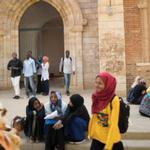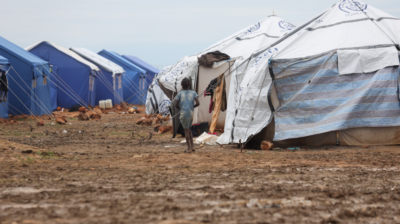Sudan's turmoil: Revolution, power struggles, and the quest for stability
Sudan’s path toward security and peace is riddled with numerous challenges and setbacks. Yet again the country is at war.
The 2018-2019 Sudanese revolution was a remarkable example of nonviolent action, however, the country continued to face a crushing economic crisis, insurgencies, and political polarization, with a security establishment bent on keeping power and an uncertain future. In October 2021, the military hijacked the transition to democracy and yet again peaceful protestors called for a civilian state. On April 15, 2023, Sudan was rocked by the news of armed confrontations between the Sudanese Armed Forces (SAF) and the Rapid Support Forces (RSF) erupting in its capital Khartoum and other five cities.
The flawed framework agreement
Subsequent to the coup, continuous nonviolent resistance has persisted, along with efforts to reach a political agreement between the sovereignty council consisting of SAF and RSF and the major political parties and civilian forces. In December 2022, a Framework Agreement was initially signed as a means to facilitate the transition to a government headed by civilians. The authenticity of this agreement was disputed as numerous activists argued that it would fail to deliver the revolutionary transformation they are striving for, prompting them to persist with their protests against it. However, within the Sovereignty Council, there was growing tension between the military and RSF which has been a significant factor in the escalation of the ongoing violent conflict.
Both the Sudanese Armed Forces (SAF) and Rapid Support Forces (RSF) share a common goal: to retain control over Sudan's power structure. This objective is driven mainly by their desire to secure their positions and evade responsibility for their actions, such as the civilian killings in Darfur, for which leaders Burhan and Hemedti have been accused.
Both the Sudanese Armed Forces (SAF) and Rapid Support Forces (RSF) share a common goal: to retain control over Sudan's power structure.
It's crucial to recognize that Burhan and other top military officials represent a continuation of the Bashir regime, with deep connections to Islamist ideology. On the other hand, the RSF, created by al-Bashir, is devoid of a specific ideological basis and is instead motivated by the pursuit of power and wealth. These shared tendencies to exert authority over civilians make the situation increasingly complex.
Though there may be disagreements between the factions, their primary concern remains their own material gains, rather than the welfare of the civilian population. The key aim of this power struggle appears to be the acquisition and control of the state and its resources, rather than any ideological conviction. This unusual characteristic of the current situation underlines the self-serving actions of these forces.
The key aim of this power struggle appears to be the acquisition and control of the state and its resources, rather than any ideological conviction.
Both al-Burhan and Hemetti accuse the other of starting the fighting in Khartoum. Prior to the fight, the RSF had stationed tanks and heavy armament in the city, while the SAF had sent a considerable number of military personnel. The RSF had also rushed to Marowe, located in North Sudan, 436 km away from Khartoum where violence had erupted, only days before the Khartoum confrontations.
Essentially, both al-Burhan and Hemetti had been preparing for a clash, having apparently lost trust in the democratic process and resorted to force. The fight for dominance inside the security sector and the state lies at the heart of the war. The timing of the integration of RSF units into the SAF has been a significant source of dispute. Before integration, Hemetti has called for required military changes to create a more inclusive and professional army. He also seems to have lobbied for the continuation of his paramilitary as a guarantee during the elections.
A new type of conflict
The current conflict in Sudan is different from past armed conflicts in the country in several .
Firstly, previous conflicts were primarily between rebel groups and the state, with military tactics that were different from those used in the current conflict. For example, in the Darfur conflict, the government relied on the para-governmental militia, the "Janjaweed" (which later in 2013 became the RSF); to carry out most of the ground attacks collaborating with the military which mostly relied on air strikes when necessary. However, the current conflict sees the military battling against the same para-governmental militias that it previously relied on, making such tactics no longer feasible. Additionally, the deployment of heavy weaponry and airstrikes in cities is prohibitively costly due to high population density and the centralization of services, making it challenging to use such . It is also significant to note that this is the first time that conflict in Sudan has spread to other densely populated cities like Merowe, Port-Sudan, and El-Obied. Additionally, it is worth mentioning that this marks the first instance of war being waged in Khartoum.
Secondly, the current conflict is taking place in a challenging economic climate, during the post-revolution period with an economic inflation rate of 400% in mid-2021. However, the most recent data from the Central Bureau of Statistics in Sudan indicates that inflation rates are subsiding, falling to 154.9% last year and declining further this year to 83% in January, and 63.3% in February. Many people contended that government statistics are not reliable, as prices remained very high. Anyhow, the ramifications of high inflation are far-reaching, impacting various aspects of life, including access to basic necessities, healthcare, and overall living standards.
Further more the current conflict started during Ramadan, a time when the pace of life typically slows down in Sudan, with people focusing on their spiritual well-being and familial connections. The conflict and economic hardships disrupted this rhythm, adding further stress to the lives of the Sudanese people. Many Sudanese individuals rely on daily labor for their income, and the outbreak of war has made this nearly impossible, causing financial instability for countless families. The ongoing power outages also exacerbate the situation, crippling businesses and industries that rely on a stable power supply, and negatively impacting the daily lives of Sudanese people.
An unduly heavy burden on women
The healthcare system is heavily affected, with shortage of medications and escalating costs of medical treatments rendering healthcare inaccessible for many, especially women. War, armed conflict, and crises have devastating effects on women and girls, whose safety and human rights are frequently neglected in the midst of violence. Sadly, this holds true for the vast majority of wars and conflicts throughout history, including the current war in Ukraine. For instance, during the conflict in Darfur, women and girls have been subjected to pervasive sexual violence, harassment, and discrimination. In times of conflict, gender-based violence (GBV) is a significant concern for women and girls, with rates of sexual violence, abuse, and torture reported at an all-time high. Women and girls are frequently objectified and viewed as weapons of war by those who use violence to assert control. More than half of the world's refugees are women and children, highlighting the disproportionate impact of violence on females. The ongoing conflict in Sudan has resulted in the displacement of millions of people, with women and girls particularly susceptible to gender-based violence, child marriage, and lack of access to reproductive healthcare. During the June 3rd massacre, medical professionals believe that over 70 instances of rape were perpetrated by paramilitary forces during an attack on a protest camp in Khartoum. Throughout the revolution, the RSF's systematic abusive actions included raiding civilian homes, further highlighting their misconduct. Crimes against humanity encompass grave offenses such as murder, torture, and rape, which are committed as part of a widespread or systematic assault on a civilian population.
War, armed conflict, and crises have devastating effects on women and girls, whose safety and human rights are frequently neglected in the midst of violence.
Research conducted by Human Rights Watch has discovered that the RSF was involved in rape across a multitude of towns and villages for an extended duration, demonstrating the extensive nature of these crimes. Eyewitness accounts of orders from commanders to carry out crimes, coupled with the RSF's consistent engagement in abusive practices, indicate that these actions were not only widespread but also systematic in nature.
The heavy bombardment of Khartoum on the night of the 15th had a profound impact on the health and well-being of expectant mothers. It is argued that the impact of war on pregnant women is multifaceted and far-reaching. Certainly, war increases tension and anxiety, which can lead to preterm births and other complications during pregnancy. A study by Torche and Villarreal (2014) asserted that exposure to violence during pregnancy was significantly associated with an increased risk of low birth weight and preterm birth.
A.N posted on Facebook: “My sister is about to give birth, and she is in her eighth month of pregnancy. Does anyone know a way to find a midwife?”
In response to this crisis, many women took to social media platforms such as Facebook to seek assistance in finding midwives for childbirth, with most of these births being premature.
The heavy bombardment of Khartoum on the night of the 15th had a profound impact on the health and well-being of expectant mothers.
Local groups organized resources and efforts to identify midwives in each area, sharing their contact information online. By the end of the first day, a list of more than 150 midwives from various parts of Sudan had been compiled. This highlights the importance of community support and resource sharing during times of crisis.
In addition to this, the shortage of sanitary products, for instance, led to women resorting to using cloth instead of sanitary pads during their menstrual cycle. In addition, the exacerbating water scarcity presents a main obstacle for women in maintaining personal hygiene during the menstrual cycle. Although some initiatives attempted to provide sanitary pads to women in need, the ongoing bombardment and restricted mobility limited the accessibility of these resources. It is essential to acknowledge and address women's specific health needs in conflict situations.
Conflict also has far-reaching impacts on the social and economic fabric of societies, further exacerbating the effects on health and well-being, issues such as post-traumatic stress disorder, depression, and anxiety disorders are important to be taken into account, due to the severe consequences, particularly for marginalized groups such as women, children, and queers.
Revolutions do not die
The Sudanese revolution began as a hopeful movement to overthrow Al- Bashir's regime and ideology, yet it has been unable to achieve its goals, leading to disappointment, fear, and panic among the people. The current situation in Sudan is uncertain, as it is unclear which faction will ultimately prevail. Both of the contending parties presently engaged in conflict subscribe to traditional heteronormative, which can perpetuate traditional- heteronormative gender roles, societal prejudices, and systemic discrimination, disproportionately affecting children, women, and queer community. The complex interplay of domestic factions, remnants of the old regime, and foreign influences have hindered the revolution's progress toward stability and prosperity. To pave the way forward, it is crucial to understand the motivations and relationships at play in the post-revolutionary period and to learn from historical and contemporary experiences of similar situations. Some point fingers at civilian groups, while others believe it was remnants of al-Bashir's ideology and his supporters. Additionally, thinly veiled foreign influences seeking to meddle in Sudanese affairs for their own interests are also suspected. War indeed has no winners, and the chaos it brings is undesirable for everyone involved. Numerous Sudanese civilians have taken to the news and social media, urging for an immediate end to the conflict. In the current situation, it is challenging to determine which side the Sudanese people should support, primarily due to the unclear nature of the ongoing events.
Achieving stability, prosperity, and social justice in Sudan will require a concerted effort from all stakeholders and people of Sudan to address the myriad challenges faced by the nation in this critical period.
This Sudan blog post is written by Samah Khalaf Allah and Afaf Doleeb.
Samah Khalaf Allah is a prominent Sudanese human rights advocate, feminist, and SRHR advocate.
She holds a Bachelor’s degree in Community Health Management from Ahfad University for Women 2013- Omdurman, Sudan, and a Master’s degree in Gender, Development, and Peace from the Regional Institute of Gender, Diversity Peace and Rights 2020- Omdurman, Sudan, currently, she’s part of the Junior Research Group at Africa multiple Cluster of Excellence as a Doctoral Researcher working on Political Transformation and Sexualities. She has worked for several civil society organizations that focused on gender justice, SRHR issues, and the inclusion of minority groups. She participated actively in the Sudanese revolution of 2018-2019, taking part in demonstrations and marches, giving lectures about Gender justice and inclusion at the sit-in area, and engaging with grassroots change agents.
Afaf Doleeb is a leading Sudanese human rights advocate with a particular interest in communications.
She holds a Master's degree in peace and Conflict Studies from the Uppsala University, and also has diplomas from the Caux S. Programme in Switzerland and the George Mason University in the USA. She is a programme specialist/project manager with more than 10 years of expertise in developing, planning, and executing programmes for national and international organizations. She has wide experience in strategic planning and business development.
The views expressed in this post are those of the authors, and do not necessarily reflect the opinions of the SNAC project or CMI.





